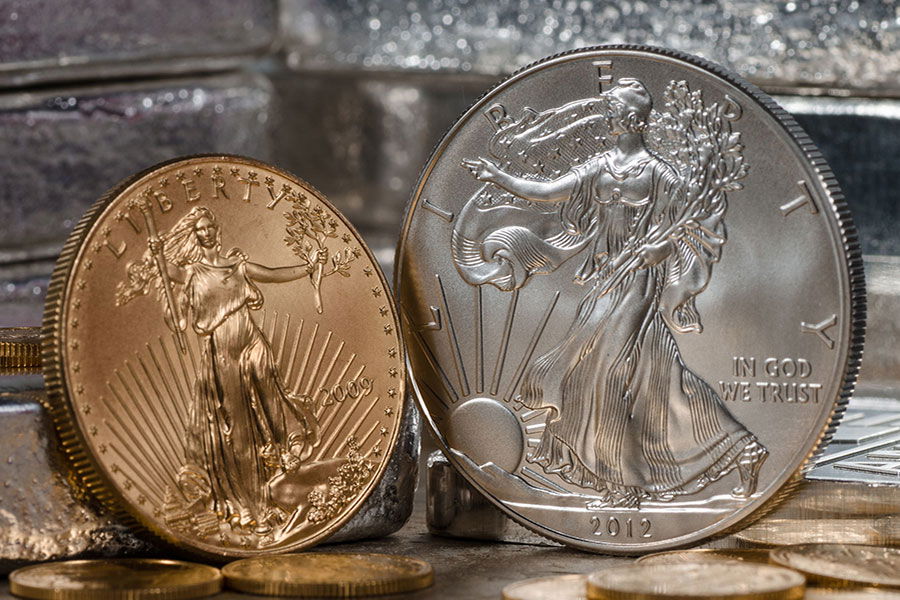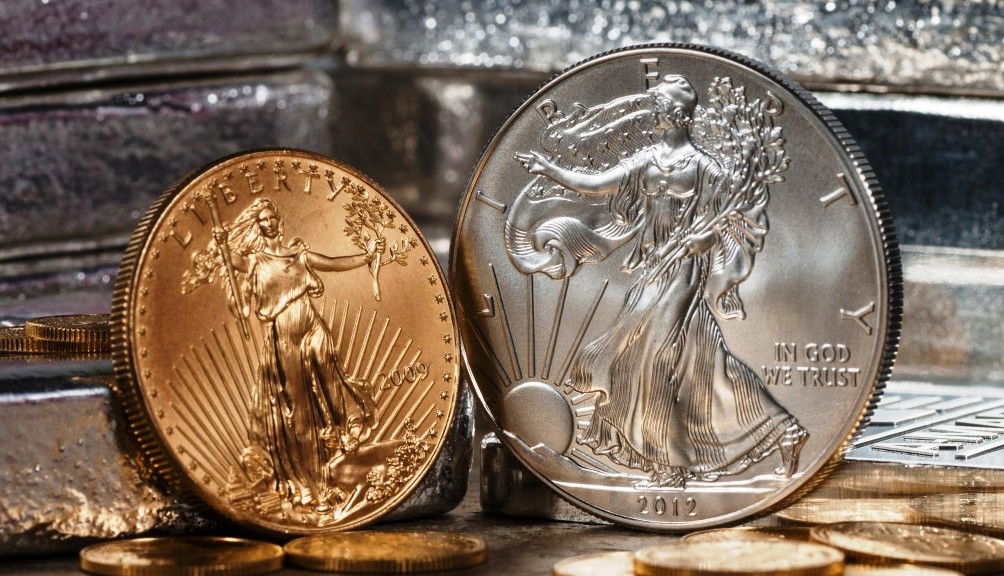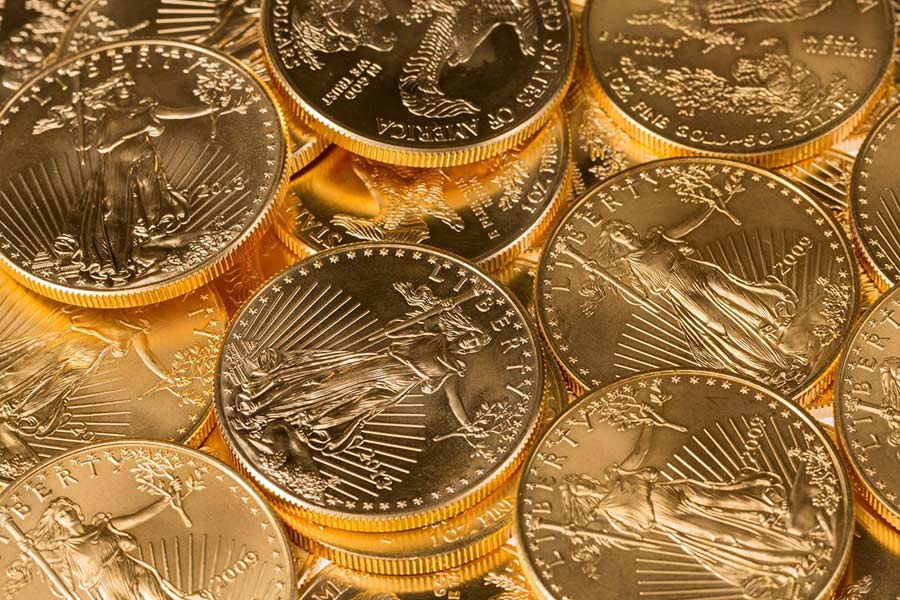Worried about inflation, market crashes, or a shrinking dollar eating into your retirement savings? A gold IRA lets you hold physical gold—and other IRS-approved precious metals—in a tax-advantaged retirement account, offering a potential hedge against economic uncertainty.

Gold IRAs are gaining attention from investors looking to move beyond stocks and bonds. But while they can add diversification and long-term protection, they also come with fees, rules, and risks that you need to be aware of upfront.
This guide breaks down how gold IRAs work, the pros and cons, what metals you can (and can’t) include, and how to decide if this kind of investment fits your retirement plan.
What is a gold IRA, and how does it work?
A gold IRA—short for “gold individual retirement account”—is a self-directed IRA that lets you hold physical precious metals like gold, silver, platinum, and palladium instead of traditional assets like stocks or mutual funds.
You can open a gold IRA as either:
- Traditional IRA – funded with pre-tax dollars, with taxes due on withdrawals
- Roth IRA – funded with after-tax dollars, with tax-free withdrawals in retirement
Instead of owning paper assets, your gold IRA will hold coins or bars that meet IRS purity standards. These metals must be stored in an approved, secure depository—not at home.
The tax rules for gold IRAs are nearly identical to standard IRAs. The difference is what you’re investing in: tangible metals instead of financial products. Some investors also diversify with gold-focused ETFs or mining stocks, but physical metal remains the core feature of a gold IRA.
See also: Best Gold IRA Companies of 2025
Pros & Cons of Gold IRAs
Gold IRAs have gained traction in recent years as investors look for ways to protect their savings from market downturns and rising inflation. But they’re not right for everyone. Here’s a closer look at the upsides and drawbacks.
Pros
- Inflation hedge – Gold has historically held its value over time, making it appealing during periods of high inflation or currency devaluation.
- Diversification – A gold IRA adds a non-correlated asset to your portfolio, helping reduce overall risk.
- More accessible than before – With more reputable companies now offering setup and management services, gold IRAs are easier to open than they used to be.
Cons
- High fees – Expect to pay setup costs, annual custodian fees, storage fees, and markups on the metals themselves.
- No income generation – Unlike stocks or bonds, gold doesn’t produce interest, dividends, or capital gains while you hold it.
- Low liquidity – Selling your metals and making withdrawals can take time and may come with additional costs.
- Risk of scams – The precious metals industry is unregulated, which makes it critical to work with a trustworthy custodian and dealer.
See also: How to Invest in Gold: A Beginner’s Guide for 2025
Traditional vs Roth vs SEP: Which Type of Gold IRA Should You Choose?
Gold IRAs come in three main types: Traditional, Roth, and SEP. The right choice depends on your tax strategy, employment status, and retirement goals. Here’s how they compare:
- Traditional Gold IRA – Funded with pre-tax dollars. You may get a tax deduction now, but you’ll pay income tax on withdrawals in retirement. Best for people who expect to be in a lower tax bracket later.
- Roth Gold IRA – Funded with after-tax dollars. You don’t get an upfront tax break, but your investments grow tax-free—and qualified withdrawals are tax-free, too. Ideal if you expect taxes to rise or your income to grow over time.
- SEP Gold IRA – Designed for self-employed individuals and small business owners. Funded with pre-tax dollars, and you can contribute much more than with a Traditional or Roth IRA. You can also contribute for employees if you have them.
Which precious metals can you hold in a gold IRA?
The IRS only allows four types of precious metals in a gold IRA: gold, silver, platinum, and palladium. But not just any coin or bar will qualify—each metal must meet strict purity standards and come from approved mints or refiners.
Below is a breakdown of the approved metals and examples of coins and bars that meet IRS requirements.
1. Gold: Must Be at Least 99.5% Pure
To be IRA-eligible, gold must be at least 99.5% pure (except for American Gold Eagles, which are exempt from the purity rule due to government backing). All gold must be stored in an IRS-approved depository and managed by a qualified custodian.
Examples of approved gold products:
- American Gold Eagle coins
- American Gold Buffalo coins
- Canadian Gold Maple Leaf coins
- Austrian Gold Philharmonic coins
- Australian Gold Kangaroo (Nugget) coins
- Credit Suisse and Johnson Matthey gold bars
- Valcambi Gold CombiBars
2. Silver: Must Be at Least 99.9% Pure
Silver must meet a slightly higher purity standard of 99.9% to qualify for IRA inclusion.
Examples of IRA-approved silver products:
- American Silver Eagle coins
- Canadian Silver Maple Leaf coins
- Austrian Philharmonic Silver coins
- Australian Kookaburra coins
- Mexican Silver Libertad coins
- Johnson Matthey and Royal Canadian Mint silver bars
3. Platinum: Must Be at Least 99.95% Pure
Platinum must meet a purity threshold of 99.95% or higher. Only specific coins and bars from approved mints are eligible.
Examples of approved platinum products:
- American Eagle Platinum coins
- Canadian Maple Leaf Platinum coins
- Australian Koala Platinum coins
- Isle of Man Noble coins
4. Palladium: Must Be at Least 99.95% Pure
Like platinum, palladium must be at least 99.95% pure and come from an approved mint or refinery.
Examples of approved palladium products:
- Canadian Palladium Maple Leaf coins
- Russian Ballerina Palladium coins
- Baird & Co. palladium bars
- Credit Suisse palladium bars
Which metals are not allowed in a gold IRA?
Many collectible or foreign coins—even if made from gold or silver—don’t meet the IRS standards for retirement accounts. These may be valuable to collectors, but they’re not eligible for gold IRA investments.
Common examples of non-eligible metals:
- Austrian Corona
- Belgian Franc
- British Sovereign and Britannia
- Chilean Peso
- Chinese Panda coins
- Dutch Guilder
- French 20 Franc
- Hungarian Korona
- Italian Lira
- Mexican Peso
- South African Krugerrand
- Swiss Franc
Always confirm eligibility with your custodian or gold IRA provider before purchasing metals. If you buy unapproved coins, they won’t be allowed in your IRA—and you could face penalties.
How to Open a Gold IRA in 4 Simple Steps
Starting a gold IRA isn’t complicated, but it does involve more steps than opening a regular IRA. Here’s what the process typically looks like:
1. Open a Self-Directed IRA
A gold IRA is a type of self-directed IRA (SDIRA), which gives you more control over your investment choices. These accounts must be opened through an IRS-approved custodian that specializes in alternative assets like precious metals.
2. Choose a Reputable Metals Dealer
Once your SDIRA is set up, you’ll need to work with a trusted precious metals dealer to select your gold or other eligible metals. Some custodians have preferred dealers, or you can choose your own—just make sure they offer IRS-approved products.
3. Fund Your Account
You can fund your gold IRA by:
- Rolling over an existing 401(k) or IRA
- Making a new contribution (subject to annual limits)
- Transferring funds from another IRA
4. Purchase Metals and Secure Storage
Your dealer will help place the order and coordinate with your custodian. The metals are then shipped to an IRS-approved storage facility, where they remain until you make a distribution.
What does it cost to open and maintain a gold IRA?
Gold IRAs come with unique fees you won’t encounter with traditional IRAs. While costs vary by provider, here’s what you can typically expect:
- Setup Fee: $50 to $300 – A one-time fee to open your self-directed IRA. Some companies waive this if you deposit a certain amount.
- Custodian Fee: $75 to $300/year – Ongoing fee for account administration and IRS compliance. This varies depending on the custodian.
- Storage Fee: $100 to $250/year – Your metals must be stored in a secure, IRS-approved depository. Segregated storage (your metals stored separately) usually costs more than commingled storage.
- Markup on Metals: 2% to 10% – Dealers often charge a premium over spot price when you buy gold, silver, or other metals. The markup depends on the type of metal and product.
Ask for a full fee schedule before committing. Some companies bundle fees, while others itemize each charge.
Should you open a gold IRA?
A gold IRA can be a smart way to diversify your retirement portfolio, especially if you’re concerned about inflation, market crashes, or a declining dollar. Precious metals have a long history as a store of value and can help reduce overall investment risk.
But it’s not for everyone. Gold doesn’t generate income, and the fees are higher than with traditional retirement accounts. If you’re looking for tax-efficient growth, stocks or index funds may offer better long-term returns.
Do your homework. Research custodians, compare fees, and make sure you’re buying from a reputable dealer. A gold IRA can add stability to your retirement plan—but only if it’s done right.
Frequently Asked Questions
Is a gold IRA a good investment?
A gold IRA can be a smart addition to a diversified retirement strategy, especially if you’re concerned about inflation or market volatility. But it’s not ideal for everyone. Gold doesn’t produce income, and gold IRAs come with higher fees than traditional retirement accounts. Whether it’s a good fit depends on your financial goals, risk tolerance, and how much of your portfolio you want to allocate to physical assets.
Can I transfer my existing IRA into a gold IRA?
Yes, you can transfer funds from an existing traditional, Roth, or SEP IRA into a gold IRA without triggering taxes or penalties, as long as the transfer follows IRS rules. This is known as a direct transfer or rollover, and many gold IRA companies will help facilitate the process.
What are the tax implications of a gold IRA?
Gold IRAs follow the same tax rules as other IRAs. With a traditional gold IRA, your contributions may be tax-deductible, but withdrawals in retirement are taxed as income. With a Roth gold IRA, you pay taxes upfront, but qualified withdrawals are tax-free. Early withdrawals from either type may incur taxes and penalties.
Can I take physical possession of the gold in my IRA?
Not while the gold is held within your IRA. IRS rules require that all IRA-owned precious metals be stored in an approved depository. If you take the gold out before retirement or without following distribution rules, it counts as a withdrawal and may trigger taxes and penalties.
How do I choose a reputable gold IRA company?
Look for companies with strong customer reviews, transparent pricing, no high-pressure sales tactics, and partnerships with IRS-approved custodians and depositories. You can also check for accreditation with the Better Business Bureau and verify how long they’ve been in business.




